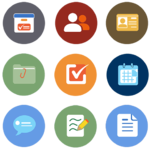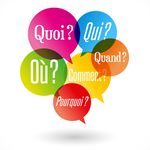Authentic Assessment
De Didaquest
Révision datée du 25 avril 2023 à 13:20 par Adel rafraf (discussion | contributions) (→{{Widget: Translation}})
Widget:Traduction
Widget:Disciplines-fiche
Widget:Written Definition-Fiche
- Alternative Assessment is a method of assessment that measures a student's level of competence in a subject rather than their level of progress. The overall goal of this type of assessment is to allow students to demonstrate their knowledge and perform tasks.
- Authentic assessment is a form of assessment that evaluates a student's learning and achievement in a real-world context, with tasks and activities that closely mimic the challenges and demands of the actual environment in which the knowledge and skills will be applied.
- Unlike traditional assessments, such as multiple-choice tests or standardized exams, authentic assessments typically involve performance-based tasks, observations, and student-produced work that require higher-order thinking, problem-solving, and creativity. Examples of authentic assessments include portfolio assessments, case studies, simulations, and project-based assessments.
- Authentic assessment is often seen as a more meaningful and effective approach to evaluation, as it allows educators to assess a student's ability to apply knowledge and skills in a practical setting, rather than just testing their ability to memorize and recall information. It also promotes deeper learning, as students are required to engage with the material in a more active and personalized way.
|
Définition graphique
- AUTRES MEDIAS
![]() Authentic Assessment
Authentic Assessment
![]() Authentic Assessment
Authentic Assessment
![]() Représentation graphique spatiale Authentic Assessment
Représentation graphique spatiale Authentic Assessment
 Concepts ou notions associés
Concepts ou notions associés
 Exemples, applications, utilisations
Exemples, applications, utilisations
|
 Erreurs ou confusions éventuelles
Erreurs ou confusions éventuelles
- One common misconception about authentic assessment is that it is subjective and cannot be standardized. However, authentic assessment can be standardized by establishing clear criteria for performance expectations and using rubrics or scoring guides to evaluate student work.
- Another misconception is that authentic assessments are not appropriate for assessing certain types of knowledge or skills, such as basic facts or procedural knowledge. However, authentic assessments can be designed to measure a wide range of knowledge and skills, including basic facts and procedural knowledge, as well as higher-order thinking skills such as critical thinking, problem-solving, and creativity.
![]() Confusion possible ou glissement de sens
Confusion possible ou glissement de sens
- Confusion entre Alternative assessment - Traditional assessment
- Myth 1: They don't allow students to show full academic knowledge
- Myth 2: They take more time to instruct and mark
- Myth 3: They are only used by new (or young?) academics
- Myth 4: Students don't like them
 Questions possibles
Questions possibles
 Liaisons enseignements et programmes
Liaisons enseignements et programmes
Widget:Related ideas-Fiche
Alternative Reading Assessments
- Bookmark – Create a bookmark to match the theme of the last book read.
- Time Capsule – Put together a group of five things from the story of the week.
- Stuffed Animal – Students can make a stuffed animal that matches the theme of the story read.
- Business Card – Summarize the story by designing a business card (this will be harder than it sounds).
- Radio Show – Create a radio program that is set in the same time as the book.
- Recipe – Make a recipe (or just the instructions) for something that a character in the story might make.
- Paper Doll – More geared towards the younger set, this activity involves creating paper dolls and costume changes for the characters in the story.
- Wanted Poster – Make a wanted poster for the antagonist in the book.
Alternative Writing Assessments
- Infomercial – Students will tape a segment that uses persuasion.
- Bumper Sticker – Design a bumper sticker with a catchy slogan for each of the writing genres.
- PowerPoint – Pairs can create a slideshow about their writing process from start to finish.
- Newscast– Students can form teams to create a news program about writing conventions (run-on sentences, spacing, punctuation, etc.).
- Comic Strip – Draw a comic strip that shows examples of figurative language.
- Brochure – Create a brochure that explains the steps involved when writing for different audiences.
- Survey – Create a survey of students’ favorite writing styles or writing pet peeves. Make a graph that explains the results.
Aides et astuces
Education: Autres liens, sites ou portails
 Bibliographie
Bibliographie
- https://luminate.prospects.ac.uk/busting-myths-on-alternative-assessments
- https://www.formpl.us/blog/alternative-assessment
- https://www.baylor.edu/atl/index.php?id=984874
- https://classful.com/the-importance-of-alternative-assessment/
Pour citer cette page: (Assessment)
ABROUGUI, M & al, 2023. Authentic Assessment. In Didaquest [en ligne]. <http:www.didaquest.org/wiki/Authentic_Assessment>, consulté le 22, novembre, 2024
Catégories :
- Sponsors Education
- Evaluation (Concepts)
- Assessment (Concepts)
- Pedagogy (Concepts)
- Psychology (Concepts)
- Educational Psycholgy (Concepts)
- Educational Sciences (Concepts)
- Non-traditionnel evaluation
- Portfolio
- Cmap
- Group test
- Authentic activities
- Continuous
- Contextualized test tasks
- Journals
- Concepts
- Authentic Assessment
- Authentic Assessment (Concepts)
- Fiche conceptuelle didactique





